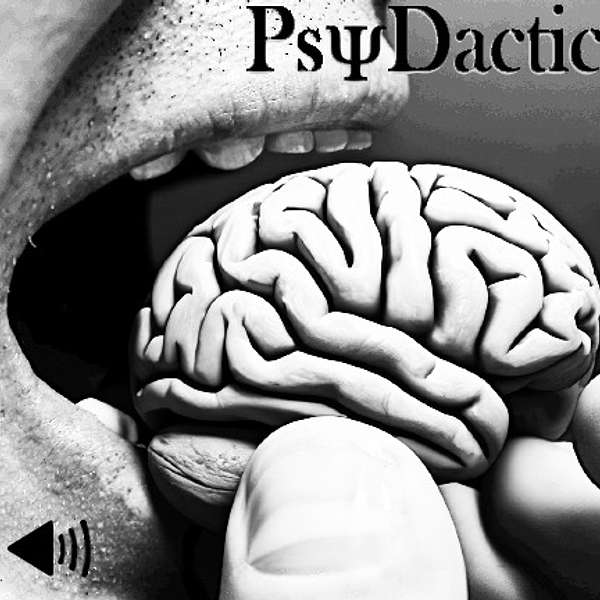
PsyDactic
A resource for psychiatrists and other medical or behavioral health professionals interested in exploring the neuroscientific basis of psychiatric disorders, psychopharmacology, neuromodulation, and other psychiatric interventions, as well as discussions of pseudoscience, Bayesian reasoning, ethics, the history of psychiatry, and human psychology in general.
This podcast is not medical advice. It strives to be science communication. Dr. O'Leary is a skeptical thinker who often questions what we think we know. He hopes to open more conversations about what we don't know we don't know.
Find transcripts with show-notes and references on each episodes dedicated page at psydactic.buzzsprout.com.
You can leave feedback at https://www.psydactic.com.
The visual companions, when available, can be found at https://youtube.com/@PsyDactic.
PsyDactic
The Narrative Fallacy in Psychological and Psychiatric Clinical Practice with Dr. Alexey Tolchinsky, PsyD
The Narrative Fallacy describes our tendency to find meaning, connections, and causal relationships where they do not necessarily exist. In this episode, Dr. O'Leary had the pleasure of interviewing Dr. Alexey Tolchinsky.
He recently published a paper called “Narrative fallacy and other limitations of psychodynamic case formulation.” Dr. Tolchenski did not invent the idea of the Narrative Fallacy, but he is working to apply this idea to his own clinical practice. We could all benefit from recognizing the ways that Narrative Fallacy plays out in our lives. The great thing about these ideas is that they are so generalizable. The Narrative fallacy is not limited to medicine or science, but can be applied, for example in how we explain to ourselves why our neighbor seems to hate us.
Tolchinsky, A. (2023). Narrative fallacy and other limitations of psychodynamic case formulation. Practice Innovations.
https://osf.io/preprints/psyarxiv/znxs5
Please leave feedback at https://www.psydactic.com or send any comments to feedback@psydactic.com.
References and readings (when available) are posted at the end of each episode transcript, located at psydactic.buzzsprout.com. All opinions expressed in this podcast are exclusively those of the person speaking and should not be confused with the opinions of anyone else. We reserve the right to be wrong. Nothing in this podcast should be treated as individual medical advice.
Welcome to PsyDactic. I am Dr. O’Leary and today is Sunday, Jun 30, 2024. This is podcast about psychiatry and neuroscience. I am currently a Fellow in Child and Adolescent Psychiatry in the National Capital Region. I make this podcast as a way to explore topics that I find fascinating and to share the wonder and excitement with you. Today, I have the pleasure of presenting an interview I did with Dr. Alexey Tolchinsky, a clinical psychologist who happened to listen to one of my episodes and emailed me a response.
He recently published a paper called “Narrative fallacy and other limitations of psychodynamic case formulation.” Dr. Tolchenski did not invent the idea of the Narrative Fallacy, which he will explain later, but he is working to apply this idea to his own clinical practice. I feel like we could all benefit from recognizing the ways that Narrative Fallacy plays out in our lives. The great thing about these ideas is that they are so generalizable. The Narrative fallacy is not limited to medicine or science, but can be applied, for example in how we explain to ourselves why our neighbor seems to hate us.
I don’t want to waste any more of your time, so let me get to the interview…
[Interview]
Tolchinsky, A. (2023). Narrative fallacy and other limitations of psychodynamic case formulation. Practice Innovations.
Taleb (2007) The Black Swan. 978-1400063512 (U.S.) ISBN 978-0713999952 (U.K.)
Thorn, Annabel; Page, Mike. Interactions Between Short-Term and Long-Term Memory in the Verbal Domain (p. 63). Taylor and Francis. Kindle Edition.
Baddeley, A., Eysenck, M. W., & Anderson, M. C. (2020). Memory. Routledge.
Baddeley, A. (2012). Working memory, theories models and controversy. The Annual Review of Psychology, 63, 12.11–12.29.
Miller, G. A. (1956). The magical number seven, plus or minus two: Some limits on our capacity for processing information. Psychological review, 63(2), 81.
Winters, N. C., Hanson, G., & Stoyanova, V. (2007). The case formulation in child and adolescent psychiatry. Child and Adolescent Psychiatric Clinics, 16(1), 111-132.
Podcasts we love
Check out these other fine podcasts recommended by us, not an algorithm.

Mindhunting: Journeys in Forensic Psychiatry
Dr Michael Schirripa
Brain Science with Ginger Campbell, MD: Neuroscience for Everyone
Ginger Campbell, MD
